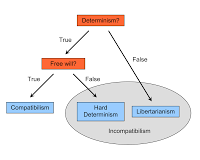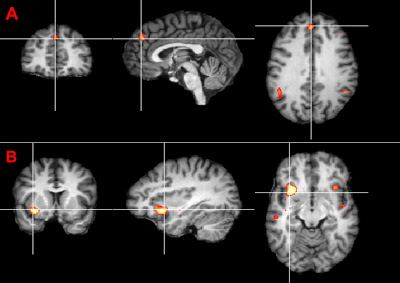Neuroscience
...that is the question asked by Brass and Haggard (2007) in their recently published paper, which speaks of "free will" in the abstract [of their article]:
 The concept of free will has been debated for centuries: is our behavior totally determined, partially determined, or not determined (i.e., free and of our own choosing)? What does "determined" mean? What are the implications for ethics? Some neurobiologists even ask, Do Fruit Flies Have Free Will? I'm not going to address those questions today, but see Volume 25, Issue 2 of Behavioral Sciences & the Law for a Special Issue on Free Will.
The concept of free will has been debated for centuries: is our behavior totally determined, partially determined, or not determined (i.e., free and of our own choosing)? What does "determined" mean? What are the implications for ethics? Some neurobiologists even ask, Do Fruit Flies Have Free Will? I'm not going to address those questions today, but see Volume 25, Issue 2 of Behavioral Sciences & the Law for a Special Issue on Free Will.
In the fMRI experiment of Brass and Haggard (2007),

Fig 2 [from Brass & Haggard, 2007]. A: Activation in the dorsal fronto-median cortex (dFMC) for the contrast of inhibition vs. action trials. B: Activation in the left anterior ventral insula for the contrast of inhibition vs. action trials.
Three major regions were more active during inhibition than during action: A: the medial portion of Brodmann area 9, or "dorsal fronto-median cortex" [usually called dorsomedial prefrontal cortex and not the former], B: the left ventral anterior insula, and the superior temporal sulcus (not illustrated here, but see this figure). Furthermore, activity in dFMC showed a negative correlation with activity in the motor cortex.
On the other hand, what regions were recruited more for action than for inhibition? As you might expect,
References
Brass M, Haggard P. (2007). To do or not to do: the neural signature of self-control. J Neurosci. 27:9141-5.
Voluntary action is fundamental to human existence. Recent research suggests that volition involves a specific network of brain activity, centered on the fronto-median cortex. An important but neglected aspect of intentional action involves the decision whether to act or not. This decision process is crucial in daily life because it allows us to form intentions without necessarily implementing them. In the present study, we investigate the neural correlates of intentionally inhibiting actions using functional magnetic resonance imaging. Our data show that a specific area of the fronto-median cortex is more strongly activated when people prepare manual actions but then intentionally cancel them, compared with when they prepare and then complete the same actions. Our results suggest that the human brain network for intentional action includes a control structure for self-initiated inhibition or withholding of intended actions. The mental control of action has an enduring scientific interest, linked to the philosophical concept of "free will." Our results identify a candidate brain area that reflects the crucial decision to do or not to do.
Libet B, Gleason CA, Wright EW, Pearl DK (1983). Time of conscious intention to act in relation to onset of cerebral activity (readiness-potential). The unconscious initiation of a freely voluntary act. Brain 106:623–642.
- Debunking People's Belief In Free Will Takes The Intention Out Of Their Movements
Undermining a person's belief in free will alters the way their brain prepares for a voluntary movement. Davide Rigoni and his colleagues, who made the finding, aren't sure what the precise mechanism for this effect is, but they speculated that...
- Mirror Neurons In Primary Motor Cortex?
The mirror neurons, it would seem, dissolve the barrier between self and others. I call them "empathy neurons" or "Dalai Llama neurons". -- MIRROR NEURONS AND THE BRAIN IN THE VAT by V.S. Ramachandran Everyone knows what mirror neurons are,...
- Talk To The Hand And Just Say No
A new fMRI paper (Grosbras et al., 2007) examined the hemodynamic response [an indirect reflection of neural activity] in 10 yr old children who were watching videos of angry faces and gestures (versus neutral faces and gestures and control stimuli,...
- Neuropsychology Abstract Of The Day: Mirror Neurons
Brain regions with mirror properties: A meta-analysis of 125 human fMRI studies Neuroscience Biobehavioral Rev. 2011 Jul 18. [Epub ahead of print] Molenberghs P, Cunnington R, Mattingley JB. Abstract Mirror neurons in macaque area F5 fire when an animal...
- Stop-signal Task
The following paper is available as an open full-download from PLoS. It provides an interesting example of the use of stop-signal tasks in pursuing a better understanding of executive functioning and its neuroanatomical correlates: Full publication Rule-guided...
Neuroscience
To Do or Not To Do...
...that is the question asked by Brass and Haggard (2007) in their recently published paper, which speaks of "free will" in the abstract [of their article]:
The mental control of action has an enduring scientific interest, linked to the philosophical concept of "free will."
 The concept of free will has been debated for centuries: is our behavior totally determined, partially determined, or not determined (i.e., free and of our own choosing)? What does "determined" mean? What are the implications for ethics? Some neurobiologists even ask, Do Fruit Flies Have Free Will? I'm not going to address those questions today, but see Volume 25, Issue 2 of Behavioral Sciences & the Law for a Special Issue on Free Will.
The concept of free will has been debated for centuries: is our behavior totally determined, partially determined, or not determined (i.e., free and of our own choosing)? What does "determined" mean? What are the implications for ethics? Some neurobiologists even ask, Do Fruit Flies Have Free Will? I'm not going to address those questions today, but see Volume 25, Issue 2 of Behavioral Sciences & the Law for a Special Issue on Free Will.In the fMRI experiment of Brass and Haggard (2007),
participants were instructed to freely decide when to execute a simple key press while observing a rotating clock hand (Libet et al., 1983). Furthermore, they were told to cancel the intended response at the last possible moment in some trials that they freely selected. After each trial, they had to determine the clock position when they formed the intention to act. Our interest focused on the comparison between trials in which subjects intentionally inhibited the action and trials in which they intentionally executed it.The task was based on the famous studies of the late great Benjamin Libet, who was asking empirical questions about free will, consciousness, and the brain before many of us were born. In the present experiment, neural activity during action trials was compared to neural activity during inhibition trials, and the results are illustrated below.

Fig 2 [from Brass & Haggard, 2007]. A: Activation in the dorsal fronto-median cortex (dFMC) for the contrast of inhibition vs. action trials. B: Activation in the left anterior ventral insula for the contrast of inhibition vs. action trials.
Three major regions were more active during inhibition than during action: A: the medial portion of Brodmann area 9, or "dorsal fronto-median cortex" [usually called dorsomedial prefrontal cortex and not the former], B: the left ventral anterior insula, and the superior temporal sulcus (not illustrated here, but see this figure). Furthermore, activity in dFMC showed a negative correlation with activity in the motor cortex.
On the other hand, what regions were recruited more for action than for inhibition? As you might expect,
The reverse contrast between action trials and inhibition trials yielded activation in a number of motor-related areas such as the primary sensorimotor cortex and the cerebellum......but also, there was
...no activation in medial or lateral prefrontal cortex. The absence of any significant difference in areas known to be involved in preparation of voluntary action, such as pre-SMA and SMA [supplementary motor area], suggests that subjects prepared intentional actions equally both in the action trials and in the inhibition trials.Does this study have anything at all to do with what is normally referred to as "self-control"? The authors believe it does...
Our results provide the first clear neuroscientific basis for the widely held view that people can refrain from doing something even if they genuinely wish to do it. We speculate that the dFMC may be involved in those aspects of behavior and personality that reflect "self-control"....even though pressing a button in a psychology experiment is devoid of the emotion and desire one might feel while screaming at a motorist who cut you off or snorting cocaine or gambling away the last of your life's savings. Or (in the extreme) drowning your five children while suffering from severe postpartum depression and psychosis.
References
Brass M, Haggard P. (2007). To do or not to do: the neural signature of self-control. J Neurosci. 27:9141-5.
Voluntary action is fundamental to human existence. Recent research suggests that volition involves a specific network of brain activity, centered on the fronto-median cortex. An important but neglected aspect of intentional action involves the decision whether to act or not. This decision process is crucial in daily life because it allows us to form intentions without necessarily implementing them. In the present study, we investigate the neural correlates of intentionally inhibiting actions using functional magnetic resonance imaging. Our data show that a specific area of the fronto-median cortex is more strongly activated when people prepare manual actions but then intentionally cancel them, compared with when they prepare and then complete the same actions. Our results suggest that the human brain network for intentional action includes a control structure for self-initiated inhibition or withholding of intended actions. The mental control of action has an enduring scientific interest, linked to the philosophical concept of "free will." Our results identify a candidate brain area that reflects the crucial decision to do or not to do.
Libet B, Gleason CA, Wright EW, Pearl DK (1983). Time of conscious intention to act in relation to onset of cerebral activity (readiness-potential). The unconscious initiation of a freely voluntary act. Brain 106:623–642.
- Debunking People's Belief In Free Will Takes The Intention Out Of Their Movements
Undermining a person's belief in free will alters the way their brain prepares for a voluntary movement. Davide Rigoni and his colleagues, who made the finding, aren't sure what the precise mechanism for this effect is, but they speculated that...
- Mirror Neurons In Primary Motor Cortex?
The mirror neurons, it would seem, dissolve the barrier between self and others. I call them "empathy neurons" or "Dalai Llama neurons". -- MIRROR NEURONS AND THE BRAIN IN THE VAT by V.S. Ramachandran Everyone knows what mirror neurons are,...
- Talk To The Hand And Just Say No
A new fMRI paper (Grosbras et al., 2007) examined the hemodynamic response [an indirect reflection of neural activity] in 10 yr old children who were watching videos of angry faces and gestures (versus neutral faces and gestures and control stimuli,...
- Neuropsychology Abstract Of The Day: Mirror Neurons
Brain regions with mirror properties: A meta-analysis of 125 human fMRI studies Neuroscience Biobehavioral Rev. 2011 Jul 18. [Epub ahead of print] Molenberghs P, Cunnington R, Mattingley JB. Abstract Mirror neurons in macaque area F5 fire when an animal...
- Stop-signal Task
The following paper is available as an open full-download from PLoS. It provides an interesting example of the use of stop-signal tasks in pursuing a better understanding of executive functioning and its neuroanatomical correlates: Full publication Rule-guided...
